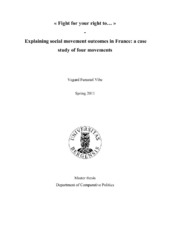| dc.description.abstract | This thesis concerns the outcome of social movements and why do some social movements succeed and others fail. By using various types of social movement literature I present a set of factors that have been known to influence outcomes. These concern the tactical repertoire and characteristics of the movement and the movement organizations. Of context relevant variables I pay heed to the existence of allies, fluctuations in public opinion and the tactics of authorities, which remains an understudied field of research within the field of social movements. I contend that a mix of movement characteristics and political context variables best explain the four movements. The cases in this thesis have carefully been selected so as to make up two successes and two failures in order to facilitate comparison. Using newspaper data, official reports and scholarly literature I seek to unravel the very complex relationships and go beyond simply finding a correlation between cause and effect by establishing whether plausible links can be found. My findings are that disruption and size of the movement are important determinants which are aided by both novelty and variety in actions. I also find that bureaucratization can both be a blessing and a curse. The latter is the case when organizations start thinking about their own survival rather than obtaining the best possible outcome, which can lead to a factionalization of the movement. Allies are relatively unimportant for explaining outcomes, but remained significant in the 2006 movement when they stalled the debates enough for mobilization to strengthen. Regarding public opinion it cannot alone explain social movement outcomes, as some have claimed. Movements are the most successful when they manage to influence the preferences of the public positively. Finally, the actions of authorities bear heavily on the end result by curtailing mobilization and forcing measures and reforms through parliament. I thus find that disruptive, big and united movements that employ a varied repertoire in a political context with favourable public opinion, substantial political allies and absence of specific authority strategies are the most likely to produce a favourable outcome. The main implications for future research are that it should include an increased focus on authority strategies and focus on both movement and context related variables. | en_US |
